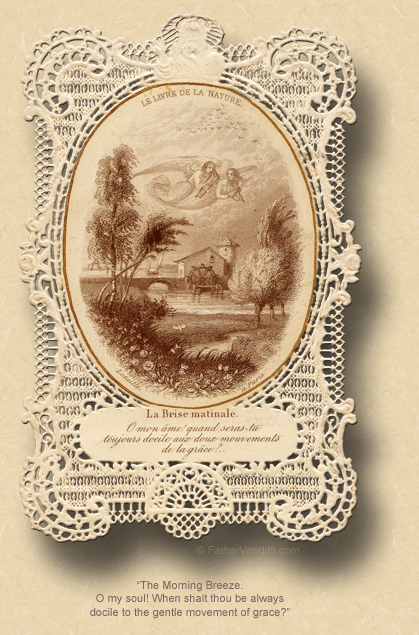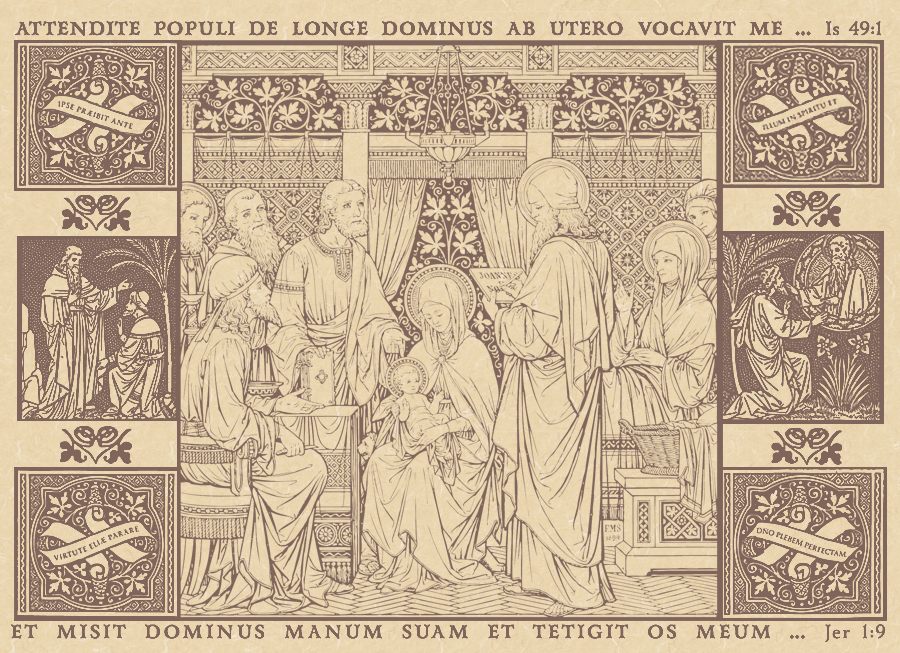Do Not Fear the Dawn.
The Eighth Day of the Greater Antiphons.*
Lessons from the feria, according to the ordinary form of the Roman Rite:
• II Samuel 7: 1-5, 8-12, 14, 16.
• Psalm 89: 2-5, 27, 29.
• Luke 1: 67-79.
The Vigil Day of the Nativity of Our Lord.*
Lessons from the proper, according to the extraordinary form of the Roman Rite:
• Romans 1: 1-6.
• [Gradual] Exodus 16: 6-7.
• Matthew 1: 18-21.
FatherVenditti.com
|
 6:52 AM 12/24/2018 — Last Friday’s Gospel lesson was our Lady’s Magnificat, and today’s is Zachariah’s Benedictus, the former being the familiar hymn sung each day at Vespers or evening prayer, and the latter being the corresponding hymn sung at Lauds or morning prayer; and, just as we observed how the Magnificat is based on several references from the Psalms and the Prophets, so is the Benedictus. In point of fact, the first words are taken verbatim from the psalms and from the ritual of circumcision. Consult a Hebrew ritual and you’ll find that, immediately after the operation, the father of the child recites this prayer: “Blessed art Thou … Who has sanctified us by Thy commandments, and has enjoined us to make him enter into the covenant of Abraham our father.” Again, here we learn how handicapped we are having to read passages like the Benedictus in a translation, since the original clues us in to so much that is hidden to us. 6:52 AM 12/24/2018 — Last Friday’s Gospel lesson was our Lady’s Magnificat, and today’s is Zachariah’s Benedictus, the former being the familiar hymn sung each day at Vespers or evening prayer, and the latter being the corresponding hymn sung at Lauds or morning prayer; and, just as we observed how the Magnificat is based on several references from the Psalms and the Prophets, so is the Benedictus. In point of fact, the first words are taken verbatim from the psalms and from the ritual of circumcision. Consult a Hebrew ritual and you’ll find that, immediately after the operation, the father of the child recites this prayer: “Blessed art Thou … Who has sanctified us by Thy commandments, and has enjoined us to make him enter into the covenant of Abraham our father.” Again, here we learn how handicapped we are having to read passages like the Benedictus in a translation, since the original clues us in to so much that is hidden to us.
Zachariah prays this magnificent hymn at the birth of his son, John the Baptist, as you know; but, he uses words which Saint Luke, in his masterful Greek, has chosen with upmost care. The word “visit,” for example, is a frequent biblical expression for the presence of God; but, strangely enough, it can also be translated either as “help” or “punish.” In other words, God has made a decision to intervene directly in the affairs of men, and it’s up to us to decide whether we will accept his intervention or attempt to reject it. The word “horn” also has deep significance in both the original Hebrew and Saint Luke’s Greek: it symbolizes strength, and when used in the phrase, “horn of salvation,” is a common Semitic reference to a mighty, saving work by God.
Note that Zachariah refers to his son not as “my child” but simply as “child,” and as “the prophet of the Most High.” The meaning is clear: personal concerns are subordinated and absorbed into the Divine Will. The Angel had already declared that this child would be another Elijah, preparing the way of the Lord.
The word “Orient” is a word redolent of long biblical tradition: it’s found in the song of Balaam when he spoke of a star advancing from Jacob, which is a reference to the Greek translation of a Jeremian text which refers to David as a star raised up by God to “reign and govern wisely”; and this appears here in the prophesy of Zachariah. The Savior will be born of the Davidic family, but mysteriously, like a star rising in the night. This night, as we learn from the passage from Isaiah which Zachariah quotes, is due to the overcast of sin; but, that darkness will soon surrender to the light of the Messiah’s glorious presence.
While Zachariah’s hymn celebrates the Baptist’s birth, it’s also a prayer of anticipation, which is how the Church uses it today. Of course, our anticipation is only imaginary inasmuch as Christ has already come and we merely commemorate that coming … unless we have the courage to see beyond our liturgical observance of past events and anticipate the second coming of our Lord and the righteous judgment that He will bring, and what that will and can mean to any of us who may now be suffering through a dark and painful period of life. Let us ask our Lord for the faith to face His coming with true longing, when the Orient from on high will really overshadow us, to shine on those who sit in darkness and the shadow of death, to guide our feet in the way of peace.

* The Greater Antiphons sung at Vespers, known as the "O Antiphons," and also serving as the verse before the Gospel in the ordinary form, are ordered and utilized differently between the two forms of the Roman Rite. The banners at the top of the pages for the Days of the Greater Antiphons have been created to reflect the original ordering of the antiphons as used in the extraordinary form. For reference, the usages of the two forms compare thus:
| Date: |
Extraordinary Form: |
Ordinary Form: |
| Dec. 17. |
O Sapientia. |
O Sapientia. |
| Dec. 18. |
O Adonai. |
O Adonai. |
| Dec. 19. |
O Radix Iesse. |
O Radix Iesse. |
| Dec. 20. |
O Clavis David. |
O Clavis David. |
| Dec. 21. |
O Oriens. |
O Emmanuel. |
| Dec. 22. |
O Rex Gentium. |
O Rex Gentium. |
| Dec. 23. |
O Emmanuel. |
O Rex Gentium. |
| Dec. 24. |
[The Vigil of Christmas.] |
O Oriens. |
Regarding December 24th: in the Roman Rite, the concept of a vigil differs completely between the ordinary and extraordinary forms. In the ordinary form, a vigil is simply a celebration of the feast the evening before, either prior to or following First Vespers (in the United States, after 4:00 PM). On Solemnities on which an obligation has been attached, this may be fulfilled at either the Mass of the vigil the evening before, or on the feast itself.
In the extraordinary form, the word “vigil” designates the entire day before a First Class Feast, and the Mass for the vigil takes place in the morning. If a feast carries an obligation, this must be satisfied on the feast itself; the extraordinary form does not offer the opportunity to satisfy an obligation on the evening before.
In the extraordinary form, December 24th is the Vigil Day of Christmas and has its own proper texts, the Days of the Greater Antiphons having concluded on the 23rd. In the ordinary form, the morning of December 24th is a day of the Greater Antiphons up to Vespers, at which point it becomes the vigil for Christmas.
|

